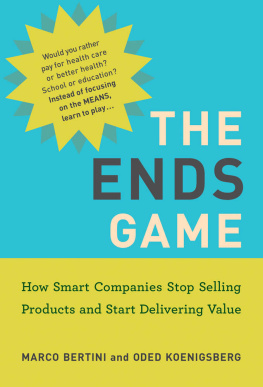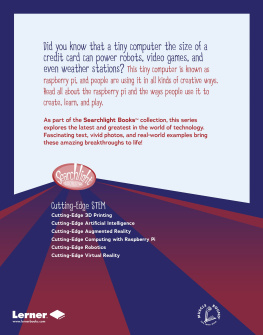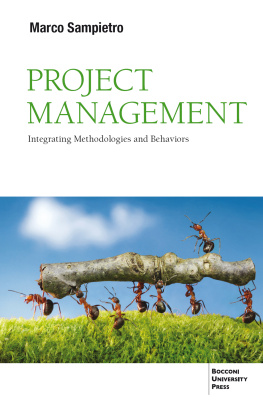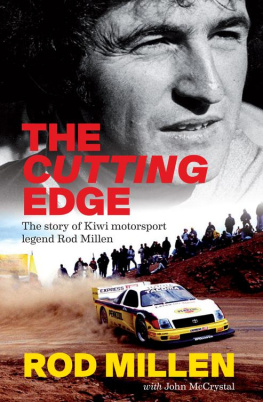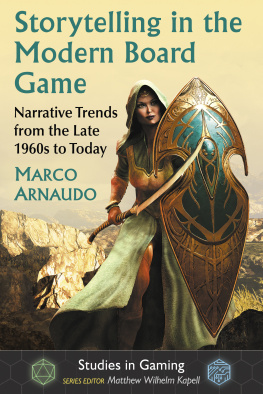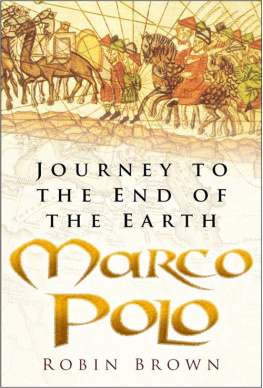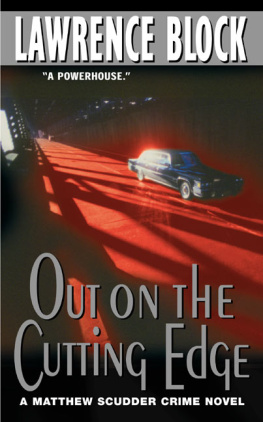Marco Bertini - The Ends Game (Management on the Cutting Edge)
Here you can read online Marco Bertini - The Ends Game (Management on the Cutting Edge) full text of the book (entire story) in english for free. Download pdf and epub, get meaning, cover and reviews about this ebook. year: 2020, publisher: MIT Press, genre: Business. Description of the work, (preface) as well as reviews are available. Best literature library LitArk.com created for fans of good reading and offers a wide selection of genres:
Romance novel
Science fiction
Adventure
Detective
Science
History
Home and family
Prose
Art
Politics
Computer
Non-fiction
Religion
Business
Children
Humor
Choose a favorite category and find really read worthwhile books. Enjoy immersion in the world of imagination, feel the emotions of the characters or learn something new for yourself, make an fascinating discovery.
- Book:The Ends Game (Management on the Cutting Edge)
- Author:
- Publisher:MIT Press
- Genre:
- Year:2020
- Rating:5 / 5
- Favourites:Add to favourites
- Your mark:
- 100
- 1
- 2
- 3
- 4
- 5
The Ends Game (Management on the Cutting Edge): summary, description and annotation
We offer to read an annotation, description, summary or preface (depends on what the author of the book "The Ends Game (Management on the Cutting Edge)" wrote himself). If you haven't found the necessary information about the book — write in the comments, we will try to find it.
The Ends Game (Management on the Cutting Edge) — read online for free the complete book (whole text) full work
Below is the text of the book, divided by pages. System saving the place of the last page read, allows you to conveniently read the book "The Ends Game (Management on the Cutting Edge)" online for free, without having to search again every time where you left off. Put a bookmark, and you can go to the page where you finished reading at any time.
Font size:
Interval:
Bookmark:
Management on the Cutting Edge series
Edited by Paul Michelman
Published in cooperation with MIT Sloan Management Review
The AI Advantage: How to Put the Artificial Intelligence Revolution to Work
Thomas H. Davenport
The Technology Fallacy: How People are the Real Key to Digital Transformation
Gerald C. Kane, Anh Nguyen Phillips, Jonathan Copulsky, and Garth Andrus
Designed for Digital: How to Architect Your Business for Sustained Success
Jeanne W. Ross, Cynthia Beath, and Martin Mocker
See Sooner, Act Faster: How Vigilant Leaders Thrive in an Era of Digital Turbulence
George S. Day and Paul J. H. Schoemaker
The Leader in a Digital World: From Productivity and Process to Creativity and Collaboration
Amit S. Mukherjee
The Ends Game: How Smart Companies Stop Selling Products and Start Delivering Value
Marco Bertini and Oded Koenigsberg

The Ends Game
How Smart Companies Stop Selling Products and Start Delivering Value
Marco Bertini and Oded Koenigsberg
The MIT Press
Cambridge, Massachusetts
London, England
2020 Marco Bertini and Oded Koenigsberg
All rights reserved. No part of this book may be reproduced in any form by any electronic or mechanical means (including photocopying, recording, or information storage and retrieval) without permission in writing from the publisher.
Library of Congress Cataloging-in-Publication Data
Names: Bertini, Marco, author. | Koenigsberg, Oded, 1964 author.
Title: The ends game : how smart companies stop selling products and start delivering value / Marco Bertini and Oded Koenigsberg. Description: Cambridge, Massachusetts : The MIT Press, [2020] | Series: Management on the cutting edge | Includes bibliographical references and index.
Identifiers: LCCN 2019058447 | ISBN 9780262044349 (hardcover)
Subjects: LCSH: Customer relations--Management--Forecasting. | Customer services--Forecasting. | Consumer goods--Forecasting.
Classification: LCC HF5415.5 .B4837 2020 | DDC 658.8/12--dc23
LC record available at https://lccn.loc.gov/2019058447
d_r0
To my mother Franca and father Roberto, my partner in crime Ester, and three children lex, Noa, and Laila.
To my mother Cipora and father Menachem, my partner Tal, and three children Tamara, Amalia, and Ivri.
It turns out that everything does happen for a reason.
Marco and Oded
List of Figures
: Customers seek solutions to their needs and wants. Access, consumption, and performance are natural checkpoints toward these solutions.
: An organization can earn revenue on what it makes (the means), on any one of checkpoints, or on the actual solutions sought by customers (the ends themselves).
: As the organization moves to align its revenue model with the ends sought by customers, efficiency gains convert market potential into actual market value.
: Organizations exist to (1) satisfy customers via their products and services and (2) earn revenue from them. Being closer to customers is great for the first task, but it creates inefficiency if the organizations revenue model does not follow suit.
The world does not lack for management ideas. Thousands of researchers, practitioners, and other experts produce tens of thousands of articles, books, papers, posts, and podcasts each year. But only a scant few promise to truly move the needle on practice, and fewer still dare to reach into the future of what management will become. It is this rare breed of ideameaningful to practice, grounded in evidence, and built for the futurethat we seek to present in this series.
Paul Michelman
Editor in chief
MIT Sloan Management Review
Most modern organizations strive to take good care of their customers. They deploy market research to gather insights that can help them develop meaningful products and services that stand out from those of competitors. They also think about their customers journeys to a purchase, trying to engineer experiences that are at once practical and engaging. Finally, todays organizations are constantly tweaking their internal structures and incentives systems to relate and respond better to the market.
All this effort is excellent. Yet, from where we stand, it is only half the battle.
While many businesses tout their innovative spirit and proudly claim to put customers at the heart of what they do, we seldom see the same determination and steadfast focus in the way they convert market potential into a financial return. If given the chance, customers would gladly pay for the solutions to their needs and wants, the ends they seek, rather than the means to achieve them. After all, they only buy products and services because they need or want something from them. Yet a combination of neglect, inertia, fear of change, and comfort with the status quo implies that most companies today still promise results but earn revenue on what comes off the factory floor, so to speak. In fact, in our experience, companies seldom challenge what they ask their customer to pay for (the revenue model question) and instead obsess over the secondary, far more tactical issue of how much customers should pay (the price question). It is as if the rules of the game in a market are inherited and immutable.
We came to write The Ends Game: How Smart Companies Stop Selling Products and Start Delivering Value because we are uncomfortable with this picture and want to shift the focus of the discussion. The rules of the game are far from immutable, and they certainly should not be taken for granted. This is increasingly true as modern digital technology delivers sharper insights into what products and services actually do to customers, empowering them to demand accountability. Business leaders and policy makers need a roadmap to develop and implement the right revenue model given this opportunity and before it becomes a threat.
At the same time, we wrote The Ends Game knowing that our student and executive audiences are interested in understanding the motivation for, and difference between, alternative modes of generating revenue. The radical and disruptive recent changes across many industries are rooted in a conscious, technology-enabled shift in revenue models. Accordingly, this interest at times stems from the realization that new technologies can help them shake things up in a market, while at other times it stems from an imminent and present threat of disruption by a bold and nimble entrant.
As academics, our first intuition was to turn to the literature for guidance, but here we found excellent treatments of individual business models such as subscriptions (the membership economy!) and collaborative consumption (the sharing economy!) rather than a general theory capable of explaining why these models exist and, importantly, how to think about them as a whole and decide what model is best deployed when.
In many ways, The Ends Game is about the future of commerce. We argue that accountability is fast becoming the critical currency of competitive advantage. This change is taking place in just about any industry we can think of, albeit at different speeds and to different extents. As such, while all the revenue models that we discuss exist, they are not equally represented. For example, while subscriptions are all the rage at the moment, in our view they are a stepping stone toward other, more customer-focused revenue models rather than the final point. The same applies to collaborative consumption. Accordingly, the book describes a continuum of plausible revenue models that allows organizations to locate their position in the broader scheme of things and identify the way forward. While we are confident about the direction of change, the pace of that change is less clear.
Font size:
Interval:
Bookmark:
Similar books «The Ends Game (Management on the Cutting Edge)»
Look at similar books to The Ends Game (Management on the Cutting Edge). We have selected literature similar in name and meaning in the hope of providing readers with more options to find new, interesting, not yet read works.
Discussion, reviews of the book The Ends Game (Management on the Cutting Edge) and just readers' own opinions. Leave your comments, write what you think about the work, its meaning or the main characters. Specify what exactly you liked and what you didn't like, and why you think so.

